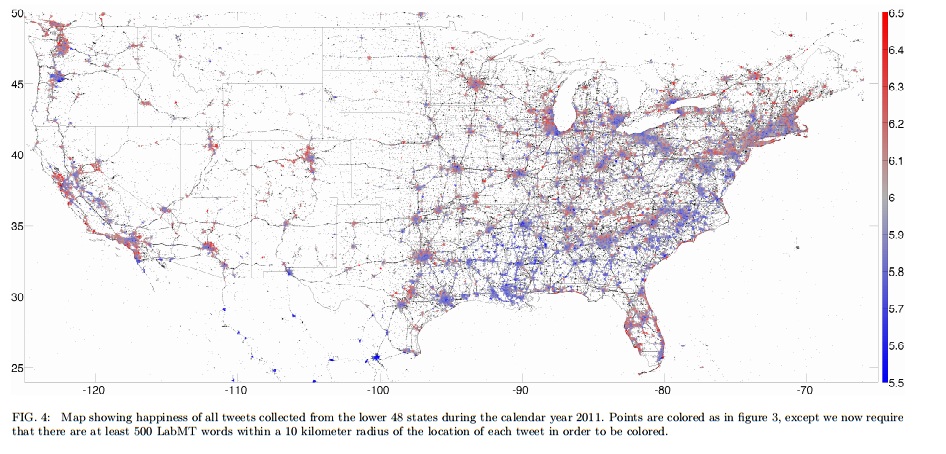If you’re tweeting from Hawaii, then the answer is yes. A team at the Vermont Complex Systems Center recently posted its new analysis of 10 million geotagged tweets to arXiv.org, calling its creation a heonometer, to determine the happiest and saddest states in the U.S.
“The Geography of Happiness: Connecting Twitter sentiment and expression, demographics, and objective characteristics of place,” studied the correlations between real-time expressions of individuals across the U.S. and a wide range of emotional, geographic, demographic and health characteristics.
The report analyzed more than 80 million words generated over the course of several recent years on Twitter. Not only does it tell us what the top happy and sad states are, but the results show how social media may potentially be used to estimate real-time levels and changes in population-level measures such as obesity rates.

Image via “The Geography of Happiness” report
Making the list as the happiest states are Maine, Nevada, Utah and Vermont. Louisiana, Missisippi, Maryland, Michigan and Delaware are the top saddest states.
The study also looked at the results for 373 urban areas to rank the happiest and least-happy cities. Vacation destination Napa, Calif., was determined to be one of the happiest cities along with Longmont, Colo.; San Clemente, Calif.; Santa Fe, N.M.; and Santa Cruz, Calif.
The five most bummed-out cities according to average word choices were Beaumont, Tex.; Albany, Ga.; Texas City, Tex.; Shreveport, La.; and Monroe, La. Again, researchers found liberal use of swear words to be a key factor in a city's overall happiness score.
The researchers coded each tweet for its happiness content based on the appearance and frequency of words determined by Mechanical Turk workers to be happy (rainbow, love, beauty, hope, wonderful, wine) or sad (damn, boo, ugly, smoke, hate, lied). While the researchers admit their technique ignores context, they say that for large data sets, simply counting the words and averaging their happiness content produces "reliable" results.
According to The Atlantic, the researchers failed to look at Twitter in Spanish, which could have made different cities appear happier on this list. Click here to read the entire report.
In a related study, researchers also turned to Twitter to find out when we are happiest. Using values assigned to words contained in 4.6 billion tweets, researchers tracked how levels of happiness rose and subsided. The last months of each year, Saturdays and the early mornings are happy times, while January, the first days of the week and late-nights are not. This survey used the same service as the state study, Mechanical Turk.
Edited by
Jamie Epstein